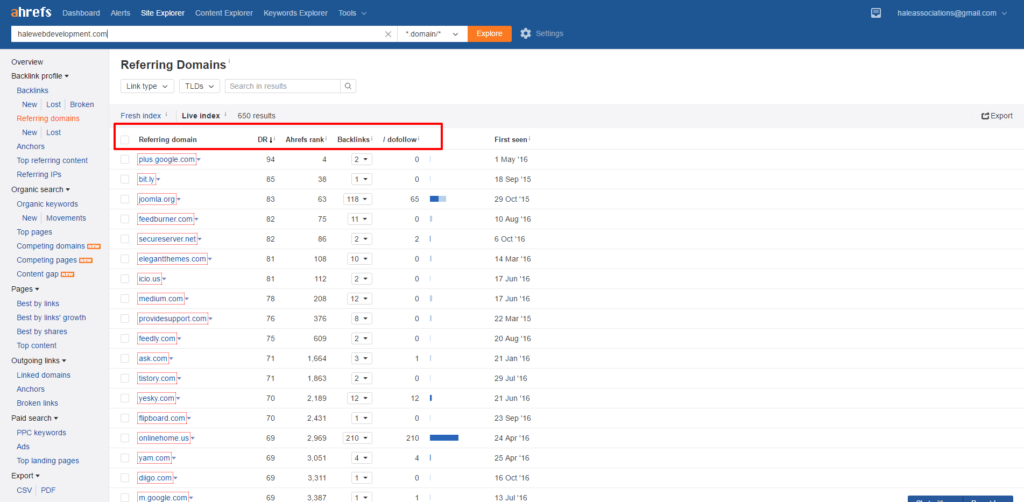 What Is Link Building?
What Is Link Building?
In the SEO community, link building is one of the most misunderstood elements of search engine optimization, not to mention one of the most time consuming and exhausting SEO tactics known to man. Even so, backlinks continue to be the highest valued tactic for SEO. When we reference link building, we’re referring to building links on-site and off-site. Links that are built on-site (within your own content) are known as internal links while links that point to your website from other domains are known as backlinks. Link building is a sensitive subject and likely far more complex than one could ever imagine, except for those who build links for a living. It’s a topic that very few link building guides cover completely.
What Are Backlinks?
Backlinks are when your domain receives a link from another website. Backlinks are one of the top Google SEO ranking factors for 2016 and have been for years. Backlinks influence a domain’s keyword rankings. The amount of influence keywords receive depends on the SEO value and link value of the linking domain. Google views backlinks as a symbol of trust, counting as a vote that your domain trust.
All backlinks have some type of value, every backlink has a different value. A few years ago, Google changed how domains build backlinks forever. They introduced do-follow and no-follow rules for all backlinks. These are called do-follow backlinks and no-follow backlinks.
Do-follow backlinks pass link value from the linking domain to the domain that receives the backlink. No-follow backlinks do not pass link value from the linking domain to the domain that receives the backlink. In link building, we strive to get do-follow backlinks because they do add value and influence keyword rankings. While no-follow backlinks don’t pass link value, we know that Google still accounts for them in search engine results. Although the value may be small, no-follow backlinks still have value and we’ve seen that in our case studies.
What Are Internal Links?
Both internal links and backlinks have purposes that are extremely important to growing SEO for any given domain. Internal links are just as defined, links within your own website. We use internal links by hyperlinking keyword terms that go to another page within the website. Just as you see internal links within this article, they are used to add value for the reader.
Not all internal links will point to your own websites. Some internal links within your page may point to other domains. In SEO and link building, this is important as you do want to link to other websites you trust. And that’s how all links should be viewed, as a trust indicator. If you build links to a domain, Google views this as a symbol of trust, a vote for that domain. In return, the domain that receives the backlink gets a vote from the linking domain.
Internal links also serve the purpose of giving your readers more options to read content. Very important to note that all internal links should be relative to the hyperlinked text you use and relative to the main topic.
Link Related Factors In SEO
While backlinks and links in general are very important for adding SEO value to a domain, we know that links aren’t everything to SEO. Google, Yahoo, Bing and other search engines do rely on link related factors to determine how domains appear in search results. While all links count in one way or the other, there’s a lot of factors that determine the overall value of any given backlink.
- Relative Domains – We know that relativity in SEO is very important. Relative backlinks are no different, it’s a high link ranking factor in SEO. Backlinks from relative domains that are related to your domain topic are going to have more weight than getting a backlink from an un-related domain. Domain authority is a SEO metric that is often targeted in link building and SEO. While having high DA websites linking to your domain is good, the backlink value can count less if it’s from an unrelated website.
- Domain Popularity – Domain popularity is another important link related factor in determining the overall value of a backlink to your domain. Websites that are popular often have a lot of other domains linking to it. Alexa ratings are often a good indicator of a site’s popularity. Domains such as Wikipedia are very popular, have a high domain authority and high Alexa rank. Backlinks from popular websites can have heavy influence on your SEO keyword rankings if they link to you.
- Niche Specific Domains – Websites that are niche-specific domains are believed to have more authority over platforms that cover multiple topics. These domains are usually keyword specific or topic specific. A site that covers only link building can have more backlink value than a domain covering all SEO tactics. Domains that use keyword specific URLs can fall in this class also.
- Domain Trust – How a website is viewed by search engines matter. A website that is trusted will have more backlink and SEO value when compared to a domain that has any value less than the comparing website. Majestic SEO is a source you can use to find what they deem as “trust flow” for any given domain. Moz has a similar feature with their spam score. Ideally, you want backlinks from trusted domains as they count for more link value than websites that are less trusted. Both Moz and Majestic SEO use link related factors to determine this score.
- Social Signals – As social media signals influence SEO more and more, we know that social shares and social links can influence keyword rankings. Domains that have high activity social signals can skyrocket keyword rankings quickly. Web pages that go viral can lead your keywords to first page ranks within hours, I’ve seen it. Never underestimate the value and influence of social media with SEO. Outdated link building guides state that social media is a small influence. While social backlinks are a small indicator that doesn’t come close to comparing to a backlink from an actual domain, social influence and signals are good value.
The Basics Of Link Building
As I said before, link building is the most time consuming and likely the hardest technique of SEO. For one, none of us completely understand how search engines use link factors to rank a domain’s keywords. While this is true, through case studies and “playing on the field,” we know a lot about backlinks and more than enough to get keywords to rank first page.
Outreach Backlink Campaigns
One of the most successful tactics to use for link building is outreach backlink campaigns. There’s a wide range of tactics used by SEOs and link builders to achieve the results they need. One of the most common outreach tactics is emailing webmasters and site owners. The link builder often targets relative websites in hopes to achieve the end goal, which is a backlink.
The great thing about outreach and why I always suggest it is due to the value it gives you. Not only are you creating backlinks that will influence your keyword rankings, you’re also making real relationships. I always tell my students that your resource list is pure gold. What’s a resource list? An outreach resource list has many different components, here’s the data I put in mine.
- Domain Name
- Domain Contact (Email, phone, personal or business)
- Contact Date
- Domain URL
- Domain Niche
- Domain Authority Of The Domain
- Domain Age Of The Domain
- Write For Us URL (If you’re targeting guest post opportunities)
- Domain Popularity (I use Alexa ranks)
- Any Associations (Other domains, other opportunities)
The Importance Of My Outreach Master Copy
I’ve been doing outreach for years. I have over 20,000 connections from all walks of life, every niche, market you could think of. I suggest you build yours now, not tomorrow. We’re talking about thousands of man hours into this resource list. For all you SEOs, Marketers, when I bring on a new client and they fall within a niche or market I have already covered, I don’t have to spend hours finding resources. I already have them. My list is updated monthly, no easy task. But my master outreach file is priceless.
In-House Link Building
This link building tactic involves you manually building backlinks on your own domains or in-house domains. This is why every SEO and Link Builder should have an in-house network of domains. The key is making sure your own domains are authority and trusted by search engines.
In-house domains save you time and effort with backlinks. You have to be careful with these. Best SEO practice is having domains with different IP addresses and different C Block locations. Too many backlinks from the same neighborhood can have a negative influence on SEO keyword rankings.
Manual Link Building
This link build technique is exactly as described, the link builder manually builds backlinks to a domain. Anywhere a backlink can be built may be considered. These include but are not limited to;
- Profiles
- Directories
- Memberships
- Groups
- Comments
- Social bookmarking
- Blogs
- Subdomains
- Forums
- RSS platforms (Feeds)
The key to remember when you’re manually building backlinks is that quality reins above quantity. Years ago, you could build thousands of backlinks and rank for any keyword that you want. In 2016, that doesn’t work. You go build a bunch of backlinks for a domain and you’ll either see your keyword rankings fall, be penalized by Google or both. It’s not about how many backlinks you build, but rather about the quality of them.
Natural Backlinks
Naturally, as your website grows, you will see natural backlinks. This is when domains link to your website without any type of influence. This can have both positive and negative effects on keyword rankings, depending on the websites that choose to link to you.
Content is everything to SEO. That’s why you always hear “content is KING.” A lot of your natural backlinks will depend on the type of content you write. It’s always best SEO practice to write high quality content that is useful, interesting and engaging. If you do, you should see growth in SEO rankings and natural backlinks. If you write poor content without meaning, you will likely not see authority websites link back to your domain.
If you have strong quality content, consider content marketing to grow your exposure and get your domain in front of link prospects. You should focus on high quality content for a number of reasons, not just backlinks. What about branding your business? How do you think prospects will feel if they visit your website and the content sucks? Do you think this will increase the chances of them buying from you? Contacting you? Absolutely not. Strive to put your best content out every single time.
PBNs
We hear a lot about PBN’s and how a correct PBN can increase search rankings. That’s very true, but your network is always at risk. PBN refers to public blog network, a cluster of websites often belonging to the same SEO, Link Builder, business and so forth. PBNs are a sensitive subject like link building. PBNs are often deemed black hat SEO, but not all PBNs are bad. There’s nothing wrong with an authority cluster of blogs or sites following guidelines, many large companies have them. Due to this, they control a lot of ground on the first page.
It’s no secret that most SEOs and webmasters try to hide their PBNs from everyone but Google. They want Google to find them even though Google is against PBNs that manipulate backlinks. Building a PBN is no easy task, it’s a process that takes time. There’s right ways and wrong ways to building, marketing, advertising and link building for PBNs. When done correctly and for the user, PBNs can be a great experience. However, you should think user first. But any PBN operator will tell you what the main purpose of PBNs are and that’s ranking keywords.
Guest Post
Guest post are a great way to begin building backlinks to your website.
How To Start Link Building
The first order of business to start link building is writing down your goals and strategies. There’s a wide range of link building strategies that have high success rates, which I’ll cover in this article. For now, why are you link building? Are you building backlinks for SEO rankings? Most of us do. However, backlinks can be built for other reasons, such as;
- Brand Awareness
- To Sell A Product
- To Sell A Service
- To Gain Web Traffic
- To Gain Trust And Authority
Link Building For SEO
If you’re building links for SEO and to improve your keyword rankings, then you need to invest in some SEO tools and software. If you don’t have the right tools, it makes your life as a SEO, Link Builder or business owner much more difficult. You need SEO and Link Building tools.
Link Building For Keyword Rankings
If you’re trying to rank for any given keyword, you can use link building to make it happen. Keep in mind, you need a page on your website to link to, targeting that same keyword. For example, let’s say we want to rank for pizza rolls. The ideal is to target websites that already rank for this keyword. If you have link building software, you can accomplish this quicker, but you can also search for it in Google.
Your Google search will show you what websites are ranking for the keyword. You know that if you can get a backlink from the ranking page, it will improve the keyword position of the keyword you’re targeting. You’ll them use link building strategies to try and get a backlink from those domains. It would probably be best to target at least the first 50-100 domains.
Research Your Competitor’s Backlink Profile
Another way to build links to improve your keyword rankings is by targeting the backlink profiles of the websites ranking high for the keyword. To do this, you’re going to need link building tools. My personal favorite is Ahrefs. You will need a paid plan from them, but as a SEO or link builder, you have to invest in the right tools. With Ahrefs, you’ll be able to pull your competitor’s backlinks in a matter of seconds.
This link building strategy calls for you to mirror the same backlinks that are linking to the ranking page. You can also target sites that are linking to the homepage also. The key to remember is that all backlinks have different values. If the ranking website has more SEO value than your domain, you may need more backlinks to achieve high keyword rankings. It’s your responsibility to determine how far to go with new backlinks.
Having a bunch of backlinks built in short-term period can have your domain’s backlink profile looking unnatural. This can cause a red flag with Google, which you don’t want. Bigger websites with many pages and post create more natural links than a website with very little. If you don’t have a lot of content, you have to be careful how many backlinks you build at onetime.
How Link Building Is Often Viewed
Link building is often mistaken as spam and that is simply false. Link building adds value to the internet and those who use it. So-called SEO experts “not mentioning no names here” have scared the hell out of everyone, telling everyone that they see that link building is bad for business. Anyone that really knows SEO and Link Building can answer this question, “what’s the most important ranking factor in SEO?” It’s backlinks. Without question and the only other tactic that compares is content on-site.
The Importance Of Backlinks
Your backlink profile tells the story, this is where you get your street cred. While there’s hundreds of SEO factors in total that affect the rankings of keywords, links alone account for a lot. I think Moz’s domain authority is a good indicator of SEO value. But in SEO, your competition says a lot about where you will eventually rank.
Hale Web Development is only a few years old. With Moz’s new domain authority update, we currently have a DA20. Not terrible for a site with our age and being that we only write a few times a year. But if DA30 is the benchmark for you or what ever your domain authority may be, it can be difficult to rank for keywords when your competitor has twice, triple the DA as you.
Link building in 2016 is far different than years ago. You have to set realistic goals for your unique situation. If keywords are very competitive, it can be tough to rank them. Link building can improve those keyword rankings but only to an extent. You still need to focus on correctly targeting your keywords, mapping out your keywords before hand and writing superior content any keyword you want to rank for.

